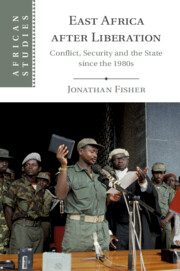Book contents
- East Africa after Liberation
- African Studies Series
- East Africa after Liberation
- Copyright page
- Dedication
- Contents
- Maps
- Acknowledgements
- Abbreviations
- Introduction
- Part I Insurgency
- Part II Liberation
- 3 From Rebels to Diplomats
- 4 Reinventing Liberation
- Part III Crisis
- Conclusion
- Bibliography
- Index
- African Studies Series
3 - From Rebels to Diplomats
Pragmatism, Aspiration and Mistrust, 1986–1995
from Part II - Liberation
Published online by Cambridge University Press: 24 February 2020
- East Africa after Liberation
- African Studies Series
- East Africa after Liberation
- Copyright page
- Dedication
- Contents
- Maps
- Acknowledgements
- Abbreviations
- Introduction
- Part I Insurgency
- Part II Liberation
- 3 From Rebels to Diplomats
- 4 Reinventing Liberation
- Part III Crisis
- Conclusion
- Bibliography
- Index
- African Studies Series
Summary
This chapter explores how the four East African liberation movements transitioned into governments and begun to negotiate their place within the region. The central argument of this chapter is that the early regional relationships of EPRDF, EPLF and NRM post-liberation elites were dominated by pragmatic, domestic preoccupations, and managing tensions with, and the distrust of, regional counterparts. Revolutionary change, at least at the regional level, was therefore far from being a lodestar. Diplomatically isolated for much of its first decade in power, NRM Uganda found itself in an instantly antagonistic set of relationships with its conservative neighbours, who feared it would seek to replicate its revolution in their own territories. Seeking to allay these concerns, Kampala promoted itself as a regional conflict mediator in Somalia and vacillated in its support for the RPF, which launched its first invasion of Rwanda from Uganda in 1990. In the Horn, EPRDF and EPLF elites focused mainly on settling the question of Eritrean independence and the shape of post-liberation Ethiopia’s political and constitutional order. The elites of Ethiopia, Eritrea and Uganda first came together in the early 1990s around shared security concerns – the perceived threat from Omar al-Bashir’s Islamist Sudan – rather than ideological agendas.
Keywords
- Type
- Chapter
- Information
- East Africa after LiberationConflict, Security and the State since the 1980s, pp. 111 - 157Publisher: Cambridge University PressPrint publication year: 2020



